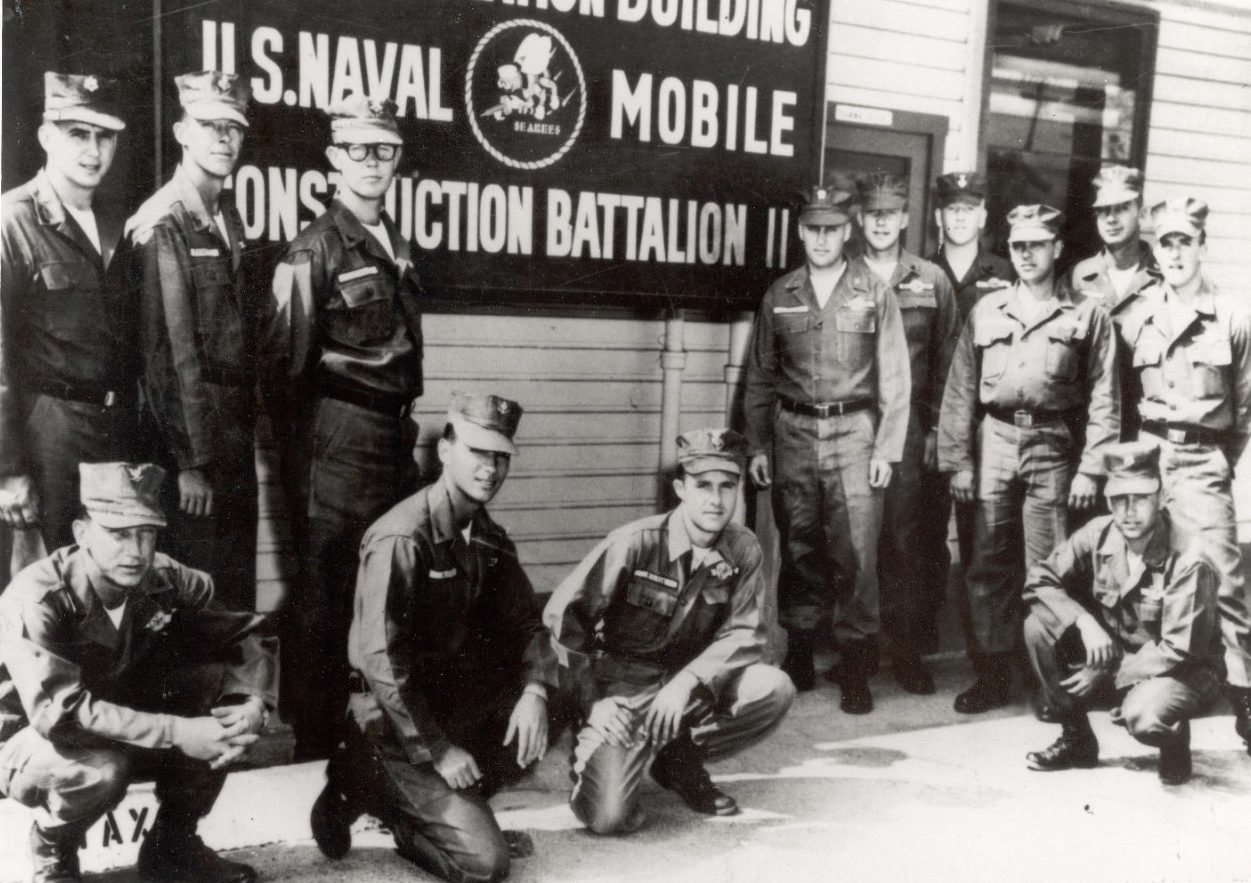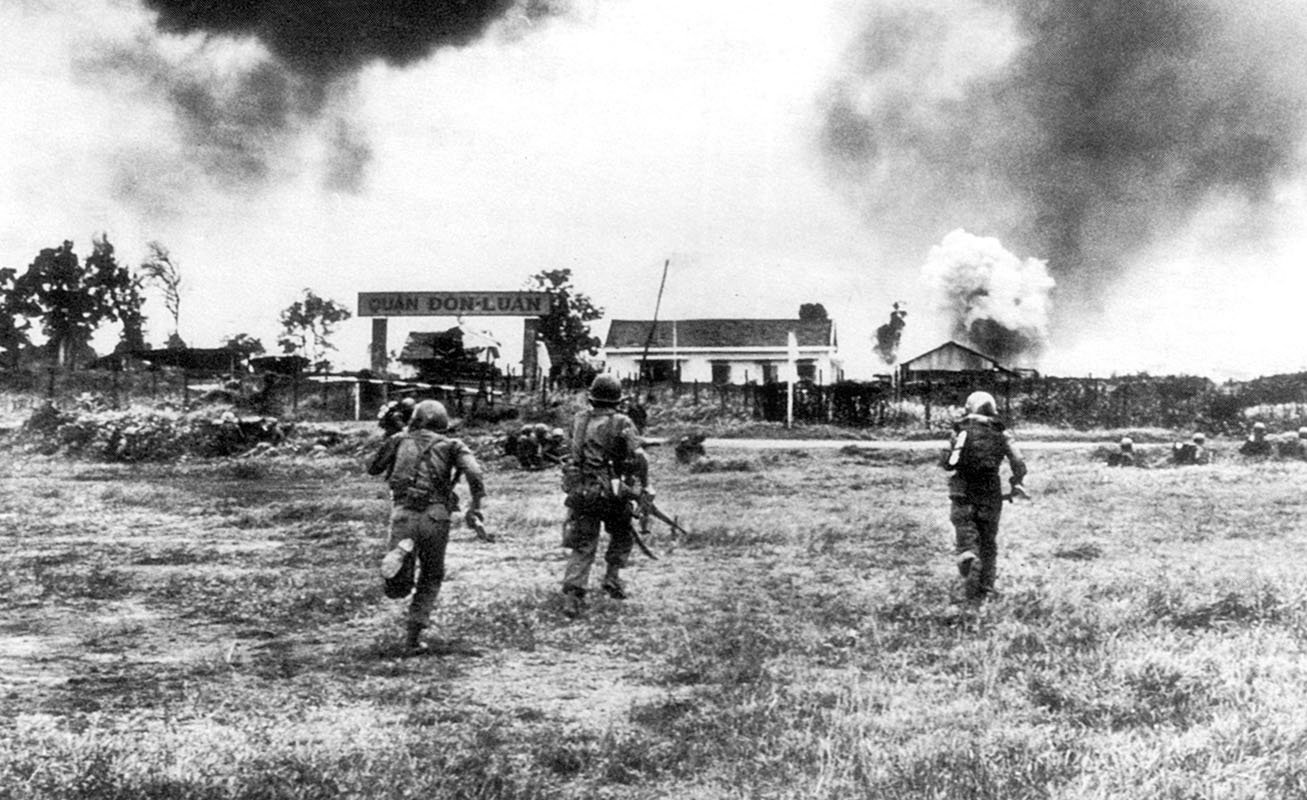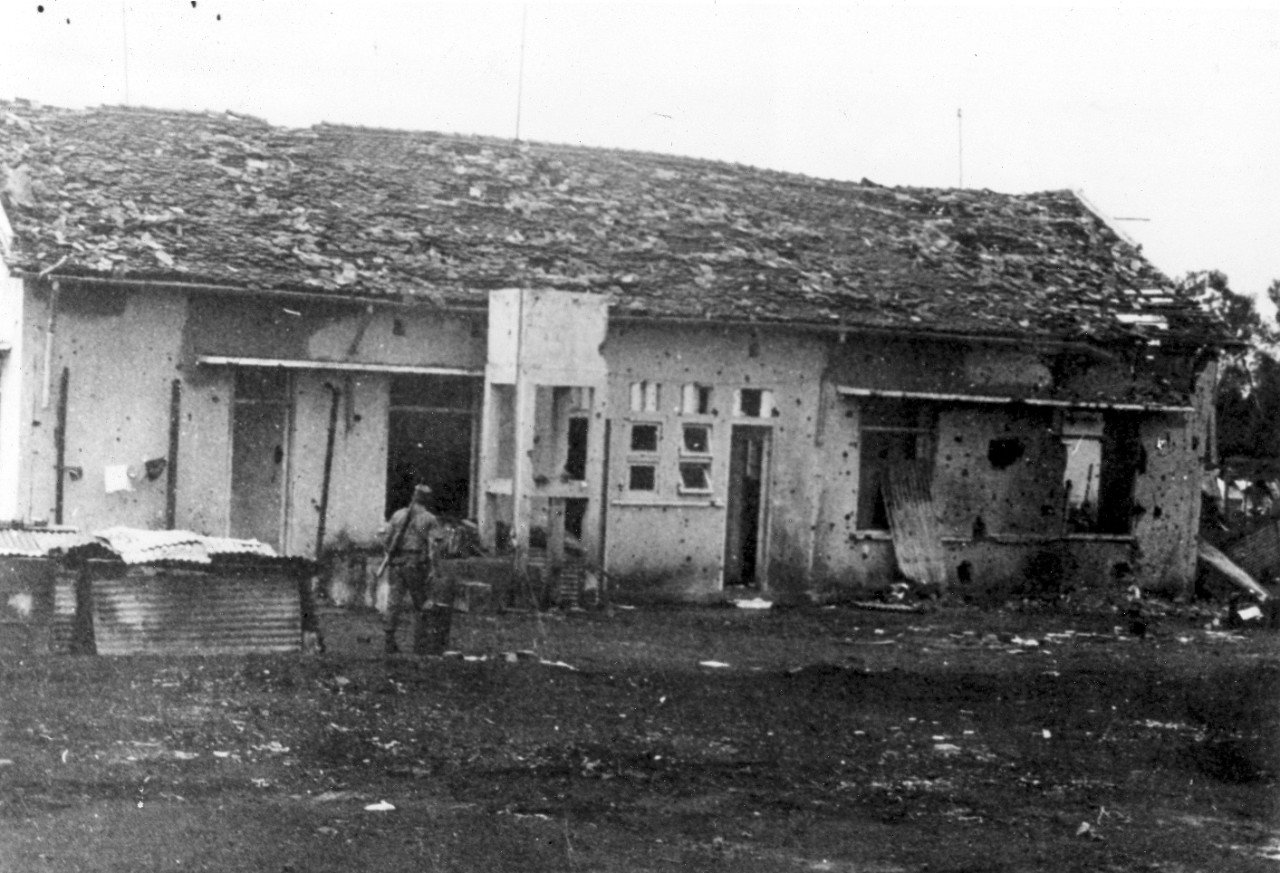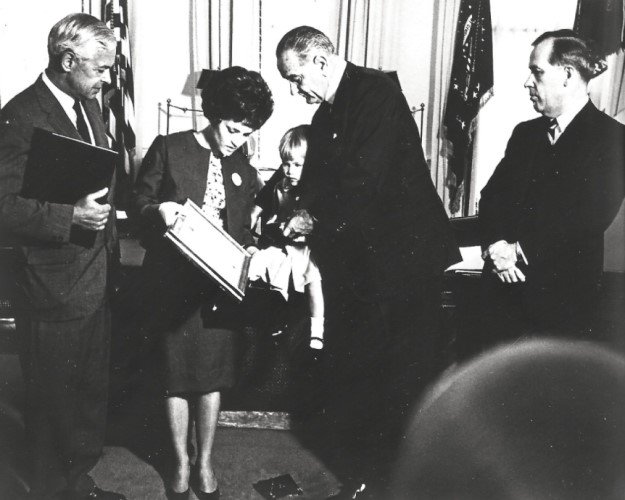How a Navy Seabee Was Awarded the Medal of Honor Alongside a Green Beret

Members of Seabee Team 1104, at Port Hueneme, Calif. CM3 Marvin G. Shields, standing at far right, and SW2 William C. Hoover, standing third from left, were killed in action at Dong Xoai, Vietnam. The nine-man team at Dong Xoai received the Navy Unit Commendation, a Medal of Honor, two Silver Stars, and six Bronze Stars. Photo courtesy of the Naval History and Heritage Museum.
On June 4, 1965, a nine-man advanced element of the Seabee Technical Assistance Team 1104 was sent to the village of Dong Xoai, an American camp located about 55 miles north of Saigon. This mission was supposed to be another building job, but it ended in a 14-hour battle in which 20 Americans and approximately 400 Vietnamese allies fought a 2,000-strong Viet Cong force. The Viet Cong were armed with flamethrowers, mortars, and small arms. Two men were awarded the Medal of Honor for the battle: Army Special Forces soldier 2nd Lt. Charles Q. Williams and Construction Mechanic 3rd Class Marvin Glen Shields, the first and only Seabee to receive the award.
Just before midnight on June 9, a reinforced regiment of approximately 2,000 soldiers from the Viet Cong 9th Division launched a full-scale attack to capture the unfinished camp occupied by 11 members of a US Special Forces team from 5th Special Forces Group (Airborne), the nine Seabees, and approximately 400 friendly Vietnamese troops and Montagnard tribesmen.
The two-pronged assault had the Viet Cong’s 272nd Regiment hit the main compound with the Americans in it, while members of the 273rd Regiment covered landing zones US forces were likely to use for reinforcements. The first barrage of mortar and recoilless-rifle fire immediately destroyed the camp’s communication equipment and aid station and wounded several Americans.
The Seabees, known for their motto, “Construimus, Batuimus,” meaning, “We build, we fight!” jumped into the battle alongside the Green Berets at defensive positions within the camp. Shields, a 25-year-old construction mechanic and former lumberjack from Port Townsend, Washington, sprang into action. Shields, another Seabee, and Special Forces medic Sgt. 1st Class James T. Taylor Jr. carried wounded Special Forces captain and outpost commander Bill Stokes to the district headquarters. From this position, the Americans made a final stand. They restored a PRC-10 radio and called for close air support to keep the enemy from overrunning the compound.

A quick reaction force of “Bandits” from the 3rd Flight Platoon, 118th Aviation Company, 145th Combat Aviation Battalion, soon arrived over the camp to conduct close air support and gunship flyovers.
“The town and compound were in shambles,” Bandit pilot Chief Warrant Officer Ralph Orlando wrote in his diary. “At least seven .50 cal. machine gun positions were located throughout the area. The VC [Viet Cong] even had flamethrowers and used human waves of troops to attack the SF [Special Forces] compound.”
In the wake of a strafing gunship run, Shields — despite shrapnel having wounded him in the face, his mouth torn open and his teeth broken — hauled ammunition from a central bunker position to outposts of the defensive perimeter.
At dawn the next day, the Viet Cong set up a .30-caliber machine-gun emplacement inside a schoolhouse just south of the district headquarters. Williams, the Special Forces second lieutenant, knew that they wouldn’t survive the day if they didn’t destroy that machine-gun position. He asked for volunteers to help take out the gun. Shields stepped up. Together the pair left the confines of their structure and leapfrogged behind blazing structures to avoid being silhouetted. They crept beyond a berm facing the school building. Williams shouldered a rocket launcher and aimed down the sight. Shields slammed the rocket into position and stepped to the side to avoid the back blast.

The projectile streaked through the air and impacted the machine-gun position nearly 150 meters away. Two more rockets completely wiped out the enemy position. While Williams and Shields retreated to the district headquarters building, a second machine gun wounded them both. Williams was shot in the right arm and leg, while two bullets shattered Shields’ right leg. Williams dragged Shields behind cover. Several men saw Williams and Shields wounded and ran to help carry Shields back to district headquarters.
The situation on the ground deteriorated, and by noon, US and Vietnamese forces were prepared to be overrun.
“I’m using my last battery for the radio and there is no more ammunition,” came a radio transmission likely sent by Special Forces Staff Sgt. Harold Crowe. “We are all wounded, some of the more serious are holding grenades with the safety pins already pulled. The VC are attacking in human waves. The last wave has been defeated but we are expecting the next wave now.”
Maj. Harvey Stewart, the 118th Aviation’s commanding officer, sprinted with other pilots and aircrew to three Huey helicopters to rescue the survivors. The Huey gunships swooped in with gun runs before coming down in a landing zone to scoop up the wounded. Shields was loaded into one of the Hueys.

“Shields was joking and cutting up to the end,” 2nd Class Hospital Corpsman Jim Keenan recalled. “When he finally went under it was very quiet — nothing dramatic — he just went to sleep. The last thing he did was to thank everyone who helped him.”
The 14-hour battle killed three Special Forces soldiers and two Seabees. Among the 15 surviving Americans, all but one were wounded. An estimated 43 Montagnards and South Vietnamese inside the camp died fighting alongside the Americans. An additional eight US helicopter crewmen, five US Army advisers, and 400 South Vietnamese soldiers died fighting outside the camp during the rescue efforts.
Shields was posthumously awarded the Medal of Honor for his actions, becoming the first and only Seabee to receive the honor. In addition, the first camp the Seabees built in Vietnam at Chu Lai was renamed Camp Shields that year. Army Special Forces 2nd Lt. Williams also received the Medal of Honor for his actions in the battle.
Read Next: The Holocaust Survivor and Jewish Refugee Who Became an American Soldier

Matt Fratus is a history staff writer for Coffee or Die. He prides himself on uncovering the most fascinating tales of history by sharing them through any means of engaging storytelling. He writes for his micro-blog @LateNightHistory on Instagram, where he shares the story behind the image. He is also the host of the Late Night History podcast. When not writing about history, Matt enjoys volunteering for One More Wave and rooting for Boston sports teams.
BRCC and Bad Moon Print Press team up for an exclusive, limited-edition T-shirt design!
BRCC partners with Team Room Design for an exclusive T-shirt release!
Thirty Seconds Out has partnered with BRCC for an exclusive shirt design invoking the God of Winter.
Lucas O'Hara of Grizzly Forge has teamed up with BRCC for a badass, exclusive Shirt Club T-shirt design featuring his most popular knife and tiomahawk.
Coffee or Die sits down with one of the graphic designers behind Black Rifle Coffee's signature look and vibe.
Biden will award the Medal of Honor to a Vietnam War Army helicopter pilot who risked his life to save a reconnaissance team from almost certain death.
Ever wonder how much Jack Mandaville would f*ck sh*t up if he went back in time? The American Revolution didn't even see him coming.
A nearly 200-year-old West Point time capsule that at first appeared to yield little more than dust contains hidden treasure, the US Military Academy said.












